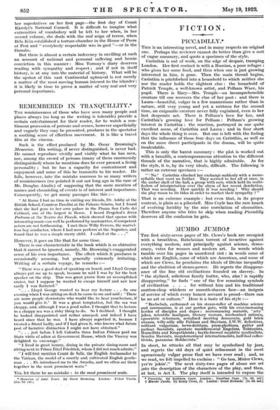REMEMBERED IN TRANQUILLITY.*
THE reminiscences of those who have seen many people and places always (so long as the writing is tolerable) provide a certain entertainment for their reader, for to watch a con- tinuous procession of persons and scenes, however superficially and vaguely they may be presented, produces in the spectator a soothing sense of effortless movement. It is like a travel film at the cinema.
Such is the effect produced by Mr. Oscar Browning's Memories. His writing, if never distinguished, is never bad. He cannot reproduce vividly and visibly what he has seen, nor, among the crowd of persons (many of them enormously distinguished) whom he mentions does he ever present a living personality ; but he has a capacity for contentment and enjoyment and some of this he transmits to his reader. He falls, however, into the mistake common to so many writers of reminiscences (we pointed it out not long ago in the case of Mr. Douglas Ainslie) of supposing that the mere mention of names and chronicling of events is of interest and importance. Consequently, we get many passages like this :- " At Rome I lost no time in visiting my friends, Dr. Ashby at the British School, Countess Pasolini at the Palazzo Sciarra, but I found that she had gone to her own palace in the Piazza San Carlo dei Catinari, one of the largest in Rome. I heard Pergolesi's Serta Padrona at the Teatro dei Piccoli, which showed that operas with interesting music can well be performed by marionettes, if competent actors are not forthcoming. I met there Willy Ferrero, the marvel- lous boy conductor, whom I had seen perform at the Augusteo, and found that he was a simple merry child. I called at the . . ."
However, it goes on like that for some time.
There is one characteristic in the book which is so obtrusive that it cannot be ignored, namely, Mr. Browning's exaggerated sense of his own importance. The effect which it produces is occasionally amusing, but generally extremely irritating. Writing of a certain voyage, he remarks :—
" There was a good deal of speaking on board, and Lloyd George always put me up to speak, because he said I was by far the best speaker on the ship. This was great praise from an accomplished orator, but I suppose he wanted to escape himself and saw how easily I was flattered."
" . . Lloyd George wanted to hear my lecture . . . So one evening when I was sitting on deck he came to me and said : There arc some people downstairs who would like to hear your lecture, if you would give it.' It was a great temptation, but the sea was choppy, and, although I was a good sailor, I thought that to lecture in a choppy sea was a risky thing to do. So I declined. I thought he looked disappointed and rather annoyed, and indeed I have heard since that he was. I have always regretted it, because I treated a friend badly, and if I had given it, who knows what future post of lucrative distinction I might not have obtained."
just before I left Calcutta three Indian Princes paid me State visits of adieu at Government House, which the Viceroy was delighted to encourage."
" I lived in great luxury, dining in the private dining-room and sitting next to Prince Eitel Friedrich, whom I did not much admire."
" I will first mention Count de Salts, the English Ambassador to the Vatican, the model of a courtly and cultivated English gentle- man . . . He introduced me to the Arcadia, and we often sat there together in the most prominent seats."
yes, let there be no mistake : in the most prominent seats.
• Memories of Later Years. By Oscar Browning. London : Maher Unwln. 110s. 121d. net.)










































 Previous page
Previous page